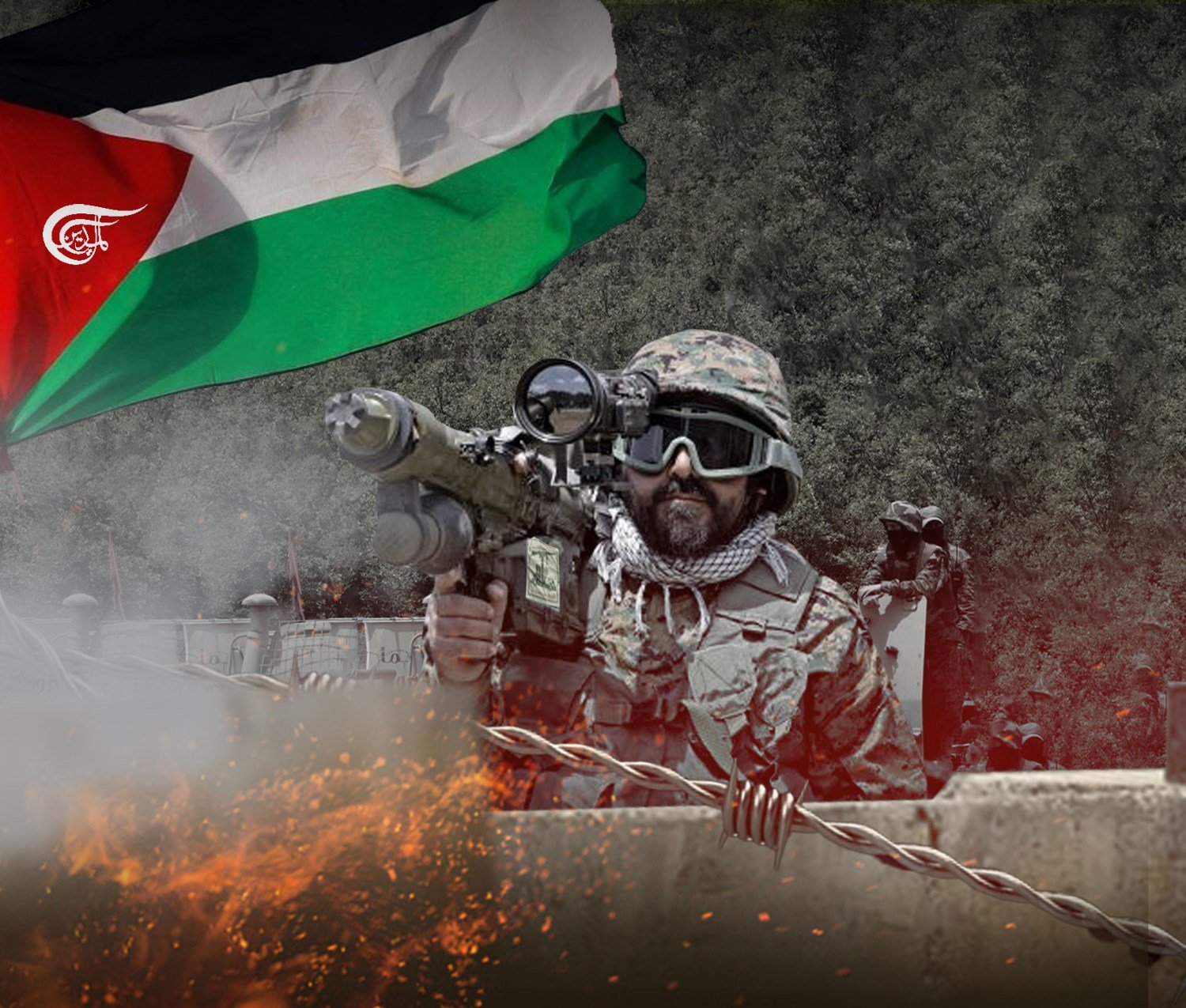'Israel’s' threats against Lebanon reflect its growing anxiety of conflict with Hezbollah
The Zionist entity’s recent posturing against Lebanese Hezbollah is nothing more than theater that is designed to impress its public audience, and its threats of war no longer alarm Arab populations.
The Zionist entity’s recent posturing against Lebanese Hezbollah is nothing more than theater that is designed to impress its public audience, and its threats of war no longer alarm Arab populations. The recent Israeli assassination campaign inside the Gaza Strip is a testament to the fact that "Tel Aviv" has been deterred from committing large escalations.
Last week, the head of the Israeli occupation army, Herzi Halevi, and the military intelligence chief, Aharon Haliva, both threatened Hezbollah with war, outlining how the Lebanese Resistance has allegedly been signaling its intention to pressure the Zionist regime. In response to this, Hezbollah Secretary-General Sayyed Hassan Nasrallah reminded the Israelis that “you are not the ones threatening war," making it clear that the Resistance will work as a united force in response to Zionist provocations in Lebanon, Syria, and Palestine. Sayyed Nasrallah also warned that a war on all the borders of occupied Palestine would involve hundreds of thousands of Resistance fighters.
The Zionist entity’s army head, Halevi, specifically cited two instances to outline his point about Hezbollah becoming more involved in escalatory measures. First, he spoke about the “Megiddo bombing” that was blamed on Hezbollah, Palestinian Islamic Jihad, and Hamas, throughout the various contradictory reports that emerged in the Hebrew media. What actually happened in northern occupied Palestine is quite difficult to tell, especially as we have no clear narrative from the Israeli side on what actually occurred and claims that one man was seriously injured in an explosive attack that was committed by an unknown person, or persons. Halevi also claimed that Hezbollah had allowed Palestinian Resistance factions to fire rockets into northern occupied Palestine back in April. No group officially claimed the rocket fire on Israeli settlements, although the message was clearly transmitted that there could be an escalation if attacks on worshippers at Al-Aqsa Mosque were to continue.
'Israel' will crumble in the event of regional war
Despite the frequent claims from Israeli officials about their intention to carry out assassinations against Hamas leaders and strikes on Iranian nuclear facilities and even to destroy entire suburbs in Beirut, the likelihood of such attacks is extremely low. If "Tel Aviv" orders any such attacks, it either signals that the regime of the current Prime Minister, Benjamin Netanyahu, is under intense pressure and verging on collapse or that they have calculated strikes with a certain percentage of security in the belief that it will not result in a multi-front escalation.
The latest assault on the Gaza Strip, between May 9 to May 13, was carefully calculated to minimize the scope of the battle. Even this pre-planned assassination campaign went off the rails and resulted in a strategic failure on a number of levels. Despite having assassinated 6 senior members of the Palestinian Islamic Jihad (PIJ) movement, the goals of claiming a domestic victory on the question of Israeli “deterrence” failed, as did the alternate intention of putting a wedge between PIJ and the more powerful Hamas party in Gaza. The mere fact that the Zionist regime chose to completely avoid Hamas, is in itself a testament to the fact that they are afraid of a wider confrontation at this time. Now, to make up for this, they spread rumors that they are seeking to carry out assassination operations against Hamas leaders like Yahya Sinwar and Ismail Haniyeh, as well as Muhammad Deif. If the Zionist regime seeks to carry out assassinations, it does not normally send out warnings.
The only reason that the Israelis would become emboldened enough to carry out assassination attempts against Hezbollah fighters, Hamas, or members of the Islamic Revolutionary Guard Corps, would be due to indications that they will be able to isolate the response to a single area or reduce the battle to replicate what was just carried out against the Gaza Strip. Airstrikes on Syria have been established as the norm for example, so the Israelis carry them out routinely due to the calculation that there will be no response, or that any response will be limited. Similarly, Israeli Mossad operatives will attempt to launch attacks inside Syria, Iraq, and Iran, usually refraining from using Israeli ID holders; these attacks do not represent existential threats.
The occupation army began a new military training maneuver on Monday, also calling a number of high-level meetings and briefings for Knesset members. The training simulations will attempt to replicate fighting on multiple fronts, including along the border of southern Lebanon and northern occupied Palestine. After Hezbollah displayed some new weapons in a parade and public exercise, using the Radwan force that is said to be set to cross the Lebanese border into the occupied territories, it is clear that the videos from these events have now taken a psychological toll on the settler population and are in need of being addressed.
It is certain that tensions are boiling and that the likelihood of conflict grows by the day, yet it would be counterintuitive for the Israeli Prime Minister, Benjamin Netanyahu, to initiate a war of aggression against Lebanon; whether that be through disproportionate retaliatory strikes or assassination attempts.
Although Hamas has become more powerful over the years and there have been no attempts at a ground invasion of Gaza since 2014, the armed wing of Hamas, the Qassam Brigades, is nowhere near as powerful as Lebanon’s Hezbollah. In August of 2022 and earlier this May, there were indeed attacks on Gaza, but Hamas has not gone to battle with the Zionist regime since May of 2021 when the Resistance group managed to pull off a significant political triumph. At this time, it is likely that the Qassam Brigades have new tricks up their sleeve to inflict damage on the Israeli military, which is why Netanyahu and former Israeli Prime Minister, Yair Lapid, both steered clear of confronting them directly.
Rather than going to war with Hezbollah, then allowing for a battle-ready Hamas to also enter the conflict, along with a range of other regional Resistance groups, the Israelis will seek to inflict small blows in what it views as separate arenas. The occupied West Bank is perhaps the most dangerous battlefield of the future, where any major development in the strength of the armed groups there could result in significant security risks for the Zionist entity. If the tens of armed groups in the West Bank are able to acquire weapons like mortars or develop more sophisticated explosives, this could pose immediate risks to the illegal settlements that are in close proximity to areas like the city of Nablus.
At this time, there is a feeling of fatigue in Palestine, as well as a growing sense of anger and frustration, something that the Netanyahu regime is attempting to take advantage of and use in its favor. There hasn’t been any major wave of operations against settlers or soldiers since Ramadan, and in addition to this, the attack on Gaza did seem to have a psychological effect on the Palestinian public, while the recent provocations occurring at Al-Aqsa going unanswered leading to a confidence growth among Zionist extremists. Despite this, the armed groups in the West Bank are growing, the Resistance in Gaza has not lost any of its strength, and it only takes a few events for the tide to turn completely and for the popular response to manifest itself in the streets. 0
Objectively, the Palestinian armed Resistance is stronger than it has ever been, as is the regional resistance. The challenge ahead is for there to be a united political force in which the Palestinian masses can confide in, and the success of the armed Resistance inside the West Bank will largely determine the future of the Palestinian leadership. Once there is a united leadership, then it is much easier to bring together the masses. As was demonstrated during the battle of Seif Al-Quds, in May of 2021, the public is a key component to the struggle, and at this time, the ability to command their commitment is hindered by the divided political scene.
If the Israelis are to launch any attack that results in a war with Lebanon, they will quickly seek to close the escalation. The very thought of Hezbollah’s 100,000-strong base of soldiers, not including allies and special forces units, strikes fear into the Zionist regime, but what makes them even more worried is the prospect of Hezbollah’s precision missiles, which carry the potential to make "Tel Aviv" look like Shujayeh (Gaza) did in 2014.
During Ramadan, it took one batch of unguided rockets to deter the Israelis from attacking worshippers inside Al-Aqsa for the remainder of the Muslim Holy month. Another indicator of how fearful the Israelis are of a conflict with Lebanon comes in the form of the concessions they offered on the maritime border agreement last year. Hezbollah threatened strikes on all of "Israel’s" oil facilities and even the prospect of war, this was enough to make them quickly sign a deal that had been sidelined for years. At the time, Benjamin Netanyahu was the leader of the Israeli opposition, he claimed that Israeli PM Yair Lapid had “surrendered” to Hezbollah and deemed it “illegal”, yet, now that Netanyahu is in power, he has done nothing to change the deal.
The threats that the Israelis make aren’t ever followed up with direct action, they will always choose a calculated and safe option when it comes to military confrontation, unless, that is, they feel there is an existential threat. Claims about assaults on Hezbollah and Iran are routine, the only difference now is that the resistance forces in the region are now prepared to commit themselves to greater action. It could be possible that there are miscalculations in "Tel Aviv", but these will lead to catastrophic consequences, and an all-out war on Lebanon will bring on the unimaginable for the Zionist regime.

 Robert Inlakesh
Robert Inlakesh
 10 Min Read
10 Min Read












